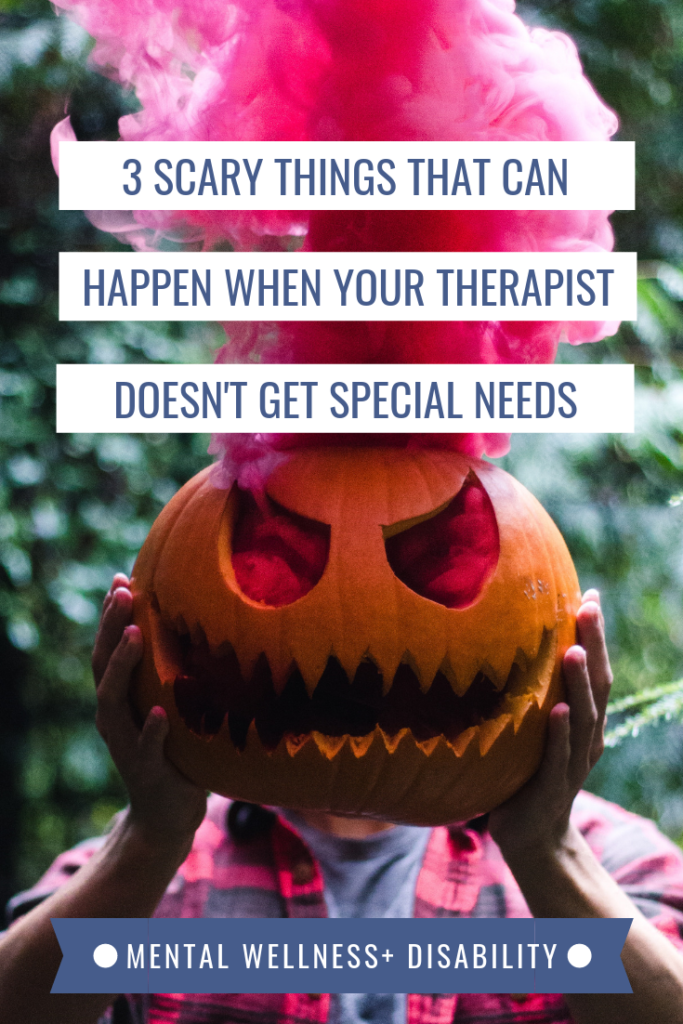In honor of Halloween, today I’m sharing 3 scary stories with you. When you’re raising a child with special needs, it’s normal to think some ‘unforgiveable’ thoughts. It’s also understandable that you’d have some big worries about the future. It makes perfect sense that you might want to meet with a counselor who specializes in helping parents raising kids with disabilities. Counseling can help you develop healthy ways to cope with those unwanted thoughts and worries. But what if something goes horribly wrong? What if your therapist doesn’t understand special needs parenting.
Cue the creepy organ music!

All kidding aside, let’s get real for a minute about what special needs parenting really means
Anxiety, guilt, and self-doubt plague many of the special needs parents I see for counseling. These parents’ anxiety is especially tricky because it is rooted in reality. It’s very possible that your child could be hurt or worse by a police officer didn’t understand their behavior. It’s always possible that your DSP or respite provider will call out unexpectedly. This leaves you balancing work responsibilities and the very physically and mentally draining work of caring for your child. You may have read more medical journals about rare diseases than most doctors have. I can almost guarantee that you’re worried about your child’s care in the future. I’ve never met a special needs parent who wasn’t.
With all of these very real things contributing to your fears, it’s understandable that there are times when you get down on yourself. The guilt and self-doubt that most parents of kids with disabilities feel is palpable. Meeting with a counselor can sound like a great idea. Having a calm space that’s just for you, with no distractions, to talk openly and honestly about your fears and self-doubts probably sounds amazing.
But I’ve heard from many parents who have tried counseling and declared it a failure. Why? Because they were meeting with a therapist who didn’t’ understand special needs parenting.
Here are 3 very scary stories that some of my favorite clients shared with me after (thankfully) deciding to give counseling another try!
When your therapist doesn’t understand special needs parenting
They think your worries and the steps you take to prevent them coming true are psychotic…like, ACTUALLY, psychotic
I once met with a couple whose son had Prader Willi syndrome.
A bit about Prader Willi syndrome
Here’s a very oversimplified description of the disorder: the mechanism that signals the brain that you’re full when you eat doesn’t function. This is also usually accompanied by a moderate degree of intellectual disability. Compounding how difficult things are, people with Prader Willi syndrome don’t need as many calories as typically developing people do.
Imagine if you didn’t quite have the expressive language skills to communicate, maybe didn’t fully understand the instructions people were giving you, and felt that you were starving all the time.
Oh, and eating what most people would consider a normal diet would result in you gaining weight.
Even though you’re constantly hungry, you need to eat less than other people, or you risk significant weight gain and all the health risks that come along with it.
It’s a very, very difficult disorder for parents to manage.
As their children get older, bigger, and hungrier, the power struggles over food can get scary and indeed dangerous.
It goes way beyond locks on the fridge.
I’ve known kids and adults with PWS who’ve drunk liquid antifreeze, or have eaten food out of a city garbage can, and who have stolen from neighbors and stores. Many kids with PWS will become aggressive in their search for food. Because of this, many of them wind up living in group homes just for residents with PWS.
What happens when your therapist doesn’t understand your child’s diagnosis
The couple had committed to caring for their son in their home for as long as possible. Even though this meant extensive supervision and meticulous oversight of his diet, they wanted him to live under their roof his entire life, it possible.
Deep down though, the parents knew that their plan to ‘just outlive’ their son wasn’t a realistic one. They’d met with another therapist to discuss their ambivalence around creating a plan for their son’s future if they died before him.
They mentioned casually to this therapist that, as a rule, they wouldn’t both board a plane unless their son was also onboard. Just to clarify, I’d call this one of those ‘rare but common’ truths of special needs parents. I don’t expect every family to have this rule, but I’ve heard it often enough that I’m not surprised when they tell me they do.
Apparently, hearing the plane rule was enough for this counselor.
The therapist halted the session saying he’d heard enough. He went on to explain to the couple that he was diagnosing them with a shared psychotic disorder.
This diagnosis, which in the DSM-5 is considered a psychotic disorder on the schizophrenic spectrum, is given when two (or more) people share a delusional belief. The Journal of the American Academy of Psychiatry and the Law notes that the disorder is rarely diagnosed, though it is occasionally seen in both criminal and civil forensic cases.
The couple couldn’t believe what they were hearing. They asked the therapist what evidence he saw suggesting that they were sharing a delusional, psychotic belief.
The therapist explained that he didn’t believe it was possible that their son’s condition warranted the extreme measures they were going to. He just knew that planning for a child’s future in the event of your death shouldn’t be so overwhelming. He thought their ‘rules’ to prevent both of their dying unexpectedly at the same time were evidence of a false belief that their death would be more traumatic for their son than the death of any parent would be for a child. In short, he felt that they were over-inflating the importance of their role in their son’s life, and that this was a sign of a serious mental illness.
It took intervention from their child’s physician to convince the therapist that the couple were sound of mind.
The couple were understandably terrified. They’d been looking for guidance and support. What they faced instead was judgment and shame.
It took a long time before they were ready to try again with another therapist. This time, they were sure to find someone who fully understood their son’s diagnosis. They realized that without this knowledge, a therapist might not fully grasp their daily realities and fears for the future.
They think you’re homicidal
Nearly every parent I’ve seen for counseling has confided that they had a wish that their child had died as an infant. Or a regret that they didn’t have an abortion when they were given a prenatal diagnosis.
A counselor who’s unfamiliar with the unique needs of special needs parents may hear this and go ‘on alert’. They will begin assessing the degree of homicidal intent and may even make a call to Child or Adult Protective Services. I’ve heard from dozens of parents that their opening up about these thoughts in therapy has led to the police coming to their home for a safety check. They have felt ashamed, misunderstood, and mistrusting of their counselor as a result.
To be clear, I’m aware that there are some parents who have intentionally harmed and even killed their children with disabilities. It is always prudent to ensure that these thoughts aren’t directive, and that the parent doesn’t have a plan or intent to follow through on them.
Usually just the opposite is true. Thoughts of wanting their child dead are unwanted. Parents resent these thoughts while acknowledging that there is some truth to them. Usually, they share these intrusive thoughts in therapy to describe how they have overcome them. Or, they are asking for help with learning to silence these uncomfortable thoughts.
The truth is that most parents raising kids with disabilities have at some point thought:
I’m not strong and I am not special. I did not want this burden, and it has made me and the life I used to live unrecognizable. I wish it wasn’t like this.
That doesn’t make you crazy, nor does it mean that you want to harm your child. It means that you’re a normal person doing their best to cope with extraordinarily challenging circumstances.
They think brief, solution focused therapy will do the trick
A common question people have before meeting with a therapist is: How long will this take?
There is some variability depending on a person’s unique circumstances, but here’s some general facts. I have excerpted these from the Handbook of Psychotherapy and Behavior Change.
- Around 30% of people experience a lasting benefit after 3 sessions of counseling
- About 50% of people respond to therapy by the 8th session
- Around 75% of people experience relief from after 14 sessions
But remember those unique circumstances I mentioned a moment ago? It turns out that raising a child with special needs is one of them. What I see in my practice, and what research supports, is that parents raising kids with disabilities are continually moving through a grief cycle as they and their children approach new life transitions.
Here’s how the parents that I work with describe it:
- I finally got used to him having ADHD. Now to find out that he has Autism, too? It helps to have a name to call it, but I’m so overwhelmed by the idea of doing it all over again. The reading and the therapies and the support groups. It’s just all too much. I knew something was wrong, but I don’t know if I can handle this being what it is.
- I just have nothing in common with my friends anymore. Their kids are all playing on traveling soccer leagues and getting ready for high school. We spend our weekends at home, because it’s just easier to stay in than to deal with a meltdown at the grocery store. I never see my husband, we have to take shifts with our son. My friends just don’t get it, and I don’t think they ever will.
- I was finally doing OK with it, I’d accepted that he would never get married or give me grandchildren. Then I get the invitation to my niece’s wedding in the mail and, boom, I felt smacked right back to square one. I just want to enjoy the kid I have, he’s a great kid. Why is it so hard to stop comparing him to everyone else?
Because of this constant navigation through grief and anger and towards acceptance, many of my counseling clients who are parents move in an out of therapy over the course of years. While I’m happy for a client if they get what they need from just a few sessions, I also know that that’s rare. The realities of special needs parenting mean that there are always transitions to adjust to on the horizon, and that the stress of parenting never really stops.
I don’t think it means that counseling doesn’t work for these parents. I just know that it means that they may need occasional check-in’s when things get tough. It’s not a sign that they’re weak or can’t cope. It just reflects that special needs parenting requires more frequent adjustment. And it’s OK to want to some help during the times when you’re struggling to adjust.
Counseling shouldn’t be scary, even if you’re raising a unique kid
In many of the intake forms that I receive from new clients, they say “I’ve tried counseling in the past, and it didn’t really do anything for me”.
I hope you will consider if perhaps the disconnect was because your counselor just didn’t understand the real challenges you face raising your child.



